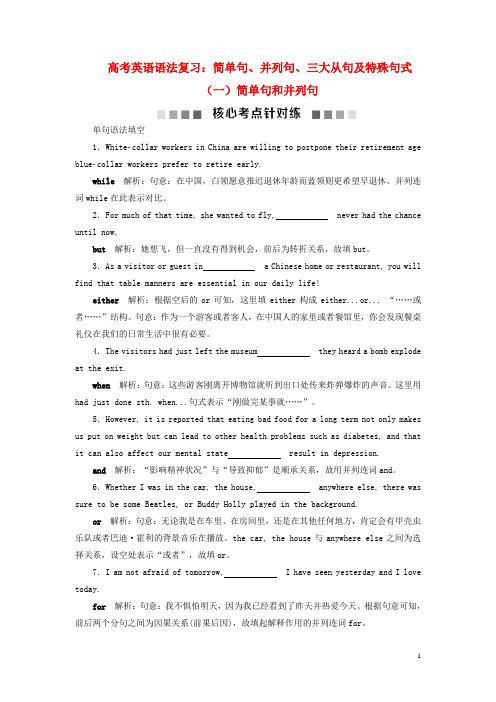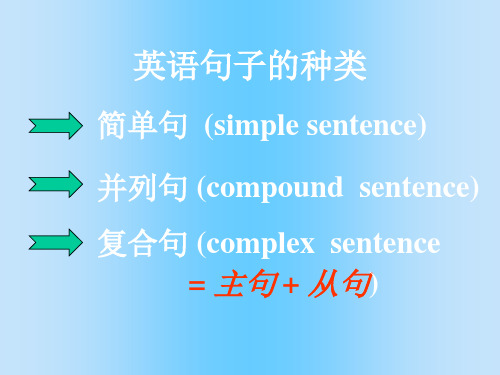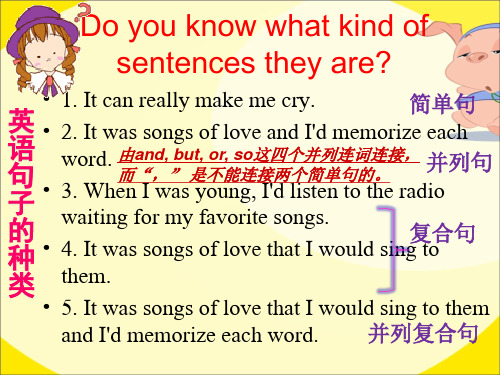高考英语语法之简单句知识点知识点复习(3)
- 格式:doc
- 大小:55.50 KB
- 文档页数:8

高考英语宜宾语法之简单句知识点知识点总复习有答案一、选择题1.Learning how to repair motors takes a long time,________?A.doesn’t it B.don’t they C.does it D.do they2.Just as Oprah Winfrey puts it, _____thankful for what you have and you’ll end up having more. A.be B.beingC.to be D.having been3.Mrs. White doesn’t believe that her son is able to make such great progress in Mathematics, ?A.is he B.isn’t heC.doesn’t she D.does she4.Lucy, finish your homework first, _____? And then let’s go out for a walk, _____?A.will you; will you B.does she; shall weC.will you; shall we D.won’t you; shan’t we5.Sarah had her washing machine repaired the day before yesterday, ________ she?A.had B.didC.hadn't D.didn't6.I don’t think he is right, ______?A.is he B.isn’t heC.do I D.don’t he7.______ great fun it is to have a swim on such a hot day!A.How B.How aC.What D.What a8.______ what you’re doing today important, because you’re trading a day of your lifefor itA.Make B.To makeC.Making D.Made9._____useful information it is!A.How B.WhatC.What a D.How a10.The shocking news made me realize ________ terrible problems we would face.A.what B.howC.that D.why11.______me tomorrow and I’ll let you know the lab result.A.Calling B.Call C.To call D.Having called 12.________ a beautiful singing voice, so she was encouraged to apply for the program of vocal music.A.Born in B.Having born inC.Being born with D.She was born with13.________ blood if you can and many lives will be saved.A.Giving B.GivenC.To give D.Give14.Don’t use your mobile phone while charging, ______ you may be shocked by electricity. A.or B.and C.but D.yet15.I feel like going to the cinema tonight,________?A.don’t I B.don’t you C.do I D.do you 16.Birds rarely build nests in our garden,________?A.don’t they B.do they C.didn’t they D.did they 17.Let’s start out early tomorrow morning,________?A.shall we B.will you C.do you D.can’t you 18.His wife had the carpets and the curtains cleaned,________?A.hadn’t she B.had she C.didn’t she D.did she 19.—You must have known each other for ages ________?—No. I got to know him just yesterday.A.mustn’t you B.didn’t you C.don’t you D.haven’t you 20.Oh, it’s so hot in here . Somebody ______ the window, please.A.opens B.open C.shall open D.will open 21.Stand over there ___ you’ll be able to see the oil painting better.A.but B.till C.and D.or22.—Must I hand in the homework right now?—‘That’s the rule. ____________A.Yes,you can.B.No,you can’t.C.Yes,you must.D.No,you mustn’t.23.______ along the quiet road at forty miles an hour, and then an old man suddenly started to cross the road in front of me.A.Driving B.Having drivenC.I was driving D.When I was driving24.— He seldom shows his family around his company, _________?— ________. And he also talks with them about the production frequently.A.doesn't he, Yes, he does B.does he, No, he doesn'tC.doesn't he , Yes ,he doesn't D.does he, Yes ,he does25.________ yourself until the plane has come to a complete stop.A.Sit B.SeatC.Sitting D.Stand【参考答案】***试卷处理标记,请不要删除一、选择题1.A【解析】【分析】【详解】考查反义疑问句。

十、简单句1、简单句的特点:简单句通常只由一个主语(或并列主语)和一个谓语(或并列谓语)构成。
2、简单句的种类:简单句一般分为陈述句、疑问句、感叹句和祈使句四种。
3、陈述句:用来说明一个事实的句子叫陈述句。
它有肯定式和否定式两种形式。
▲陈述句的肯定式:He is a middle school student.(他是个中学生)/ I have a hammer in my hand.(我手上有把锤子)/ She teaches us geography.(她教我们地理)/ The new play was good enough and everybody enjoyed it.(新的话剧非常好大家都喜欢)▲陈述句的否定式:1)谓语动词如果是be 、助动词、情态动词时,在它们的后面加“not”。
如:My brotheris not a teacher.(我的弟弟不是教师)/ He does not have a cousin.(他没有堂兄弟)/ I will not go there tomorrow.(明天我不去那儿)/ My mother is not cooking a meal inthe kitchen.(我母亲现在不在厨房里做饭)/ You must not make such mistakes again.(你不该再犯类似错误了)/ We haven’t discussed the question yet(我们还没有讨论那个问题呢).2)谓语动词如果没有上述词语而是其他动词时,须在它的前面加do not(don’t).如:Idon’t know anything about it.(此事我一无所知) / Li Ming does not feed pigs in thecountryside.(李明不在农村养猪)/ We didn’t expect to meet her right here.(我们没指望着在这里见到她)/ We didn’t have a meeting yesterday afternoon.(昨天下午我们没有开会)3)如果“have”作“有”讲,也可以在它后面加not构成否定式,其形式与have got的否定式相同。

高考英语语法复习:简单句、并列句、三大从句及特殊句式(一)简单句和并列句单句语法填空1.Whitecollar workers in China are willing to postpone their retirement age bluecollar workers prefer to retire early.while解析:句意:在中国,白领愿意推迟退休年龄而蓝领则更希望早退休。
并列连词while在此表示对比。
2.For much of that time, she wanted to fly, never had the chance until now.but解析:她想飞,但一直没有得到机会,前后为转折关系,故填but。
3.As a visitor or guest in a Chinese home or restaurant, you will find that table manners are essential in our daily life!either解析:根据空后的or可知,这里填either构成either...or... “……或者……”结构。
句意:作为一个游客或者客人,在中国人的家里或者餐馆里,你会发现餐桌礼仪在我们的日常生活中很有必要。
4.The visitors had just left the museum they heard a bomb explode at the exit.when解析:句意:这些游客刚离开博物馆就听到出口处传来炸弹爆炸的声音。
这里用had just done sth. when...句式表示“刚做完某事就……”。
5.However, it is reported that eating bad food for a long term not only makes us put on weight but can lead to other health problems such as diabetes, and that it can also affect our mental state result in depression.and解析:“影响精神状况”与“导致抑郁”是顺承关系,故用并列连词and。

英语句子结构分类英语句子结构分类:简单句,并列句和复合句的概念及区别1.简单句:无论句子长短,只包含一套主谓结构,句子中个个成分都是单词或短语。
有时主语或谓语可以是并列结构。
请划出下面句子的主谓宾成分。
The accident happened yesterday afternoonOur English teacher is thirty years old.He put the dictionary in the backpack.Grandma told me an interesting story last night.She kept the door open.My classmates and friends all received my Christmas cards and thanked me very much.2.并列句: 由并列连词and/but/or/so/however/for等把两个或两个以上的简单句连接起来。
如:Come here and I’ll help you. 请划出两个分句并判断各分句的成分。
并列连词:一、表转折的并列连词主要有but(但是), yet(可是), while(而,却)等二、表选择的并列连词主要or (或者,还是,否则), either, or (不是、就是), neither, or,(既不、也不) otherwise (要不然)等。
三、表联合的并列连词主要有and, not only, but also,(不但,而且), when(=and just at this time 就在这时)等。
四、表因果的并列连词主要有for(因为), so(因此)等。
并列句例句:1. This is the custom of China. They are not like us to finish it in one drink, _____but_____prefer to drink by taking a small amount at a time.2. My mother wants to decorate our rooms in a modem look__while_____my father prefers a traditional style.3. It was time for her to have a new baby, ___and____it was also time for the young panda to independent.4. He is a shy man,__but/yet_______he is not afraid of anything or anyone. 解析:But/yet转折连词。


高考常考英语语法知识点总结归纳一、主谓一致主谓一致是英语语法中的基本知识点,常常考察于高考中。
在句子中,主语和谓语动词需要在人称和数上保持一致。
例句:1. My brother is a doctor.(我的兄弟是一名医生。
)2. The students are playing basketball.(学生们正在打篮球。
)二、时态时态是表示动作发生的时间的一种语法形式。
掌握时态的正确用法,能够使句子表达更加准确,避免时态错误。
1. 一般现在时(Simple Present Tense)一般现在时表示经常性或普遍性的动作或状态。
例句:1. They usually go to school by bus.(他们通常乘公共汽车去上学。
)2. Water boils at 100 degrees Celsius.(水在100摄氏度时沸腾。
)2. 现在进行时(Present Continuous Tense)现在进行时表示正在进行的动作。
例句:1. I am studying for the exam.(我正在为考试学习。
)2. She is watching TV right now.(她正在看电视。
)3. 过去时态(Past Tense)过去时态表示过去某个时间发生的动作或存在的状态。
例句:1. We visited the Great Wall last week.(我们上周参观了长城。
)2. He worked in that company for three years.(他在那家公司工作了三年。
)三、从句的引导词从句是一个可以独立存在的句子,它通常包含一个主语和谓语。
从句根据其功能可以分为名词性从句、形容词性从句和副词性从句。
1. 名词性从句名词性从句在句子中充当名词的角色,可以作主语、宾语、表语、同位语等。
例句:1. What he said is true.(他所说的是真的。
)2. I don't know where he is.(我不知道他在哪里。
2020高考英语单项选择常考知识点总结:简单句
高考英语单项选择常考知识点总结:简单句
根据语法形式,即句子的结构,英语的句子可分为简单句、并列句和复合句。
简单句的基本形式是由一个主语加一个谓语构成。
其它各种句子形式都是由此句型发展而来,如五大基本句型:
1.主语+谓语,这种句型简称为主谓结构,其谓语一般都是不及物动词,例:
Things change.事物是变化的。
--Did you go by sea?你们走的是海路吗?
--NO,we flew.不,我们是飞去。
2.主语+连系动词+表语,这种句型称为主系表结构,其实连系动词在形式上也是一种谓语动词,但实质上表语成了谓语,例:Mr. Turner is an artist.特纳先生是位画家。
3.主语+谓语+宾语,这种句型可称为主谓宾结构,它的谓语一般多是及物动词,例:
We never beat children.我们从来不打孩子。
4.主语+谓语+宾语+宾语,这种句型可称为主谓宾宾结构,其谓语应是可有双宾语的及物动词,两个宾语一个是间接宾语,一个是直接宾语,例:
He gave the book to his sister.他把这本书给了他的妹妹。
I'll write you a long letter.我将写给你一封长信。
5.主语+谓语+宾语+宾补,这种句型可简称为主谓宾补结构,其补语是宾语补语,与宾语一起即构成复合宾语,例:
I found the book easy.我发现这本书不难。
(形容词easy作补语)
I'll let him go.我将让他去。
(不定式go用作补语)。
高三高考英语语法复习知识点总结高三高考英语语法复习知识点总结总结是指对某一阶段的工作、学习或思想中的经验或情况加以总结和概括的书面材料,它能够使头脑更加清醒,目标更加明确,为此要我们写一份总结。
那么如何把总结写出新花样呢?以下是小编整理的高三高考英语语法复习知识点总结,希望能够帮助到大家。
高三高考英语语法复习知识点总结1none、all 的用法a. All has been done.(作主语,表示“所有事”谓动用单数) All are present . (作主语,表示“所有人”谓动用复数)b. None of the girls in our class like/likes football. 注意:在回答what/who 问句时,用nothing/nobody;而在回答how many/How much……问句时用none.Who is in the classroom? Nobody. What is in your hand? Nothing. How much money do you have? None.every、each的使用1)every只能修饰名词,而each既可修饰名词,也可作名词使用。
eg: every day、each classroom、each of the student2)在单独作主语、同位语、宾语时只用each. a. Here are enough glasses. Each of you can get one. b. We each should listen to the teachers carefully.3)every能表达“每隔”的'含义,而each则不能。
every three days 每3天、每隔2天 every few years每隔几年every other day /week/line每隔1天/1周/1行4)every与one连用,可用of修饰( 要分开写)。
高考英语必考语法知识点归纳总结在高考英语考试中,语法是一个非常重要且必考的内容。
掌握语法知识点不仅可以帮助我们正确理解句子的含义,还可以帮助我们准确地表达自己的意思。
下面将对高考英语必考的语法知识点进行归纳总结。
一、动词及时态1.动词的基本用法:- 动词的基本形式用于表达一般情况;- 动词的过去式用于表示过去发生的动作或状态;- 动词的现在分词形式可用作形容词或进行时态的谓语;- 动词的过去分词形式可用作被动语态的谓语。
2.动词的时态:- 一般现在时:表示经常性、习惯性的动作或状态;- 现在进行时:表示正在进行的动作;- 一般过去时:表示过去某个时间发生的动作或状态;- 过去进行时:表示过去某个时间正在进行的动作;- 将来时:表示将来发生的动作或状态。
3.动词的语态:- 主动语态:表示主语进行或完成动作;- 被动语态:表示主语接受动作。
二、代词1.人称代词:- 主格代词用作主语;- 宾格代词用作宾语或介词的宾语;- 形容词性物主代词用于修饰名词;- 名词性物主代词在句中充当名词的作用;- 反身代词表示动作的主体同时也是动作的承受者。
2.指示代词:- 指示代词可用于指示距离的远近或在句中代替特定的事物。
3.不定代词:- 不定代词用于代替不确定或泛指的人或事物。
三、形容词和副词1.形容词:- 形容词修饰名词,用于描述或限定名词。
2.副词:- 副词修饰动词、形容词或其他副词,用于描述或限定动作的方式、程度等。
四、句型和从句1.简单句:- 简单句由主语和谓语构成,能够独立表达一个完整的意思。
2.并列句:- 并列句由两个或多个独立的分句组成,各分句之间用连词连接。
3.复合句:- 复合句包括一个主句和一个或多个从句。
4.定语从句:- 定语从句用来修饰一个名词或代词,并且不能独立成句。
5.名词性从句:- 名词性从句可以在句子中充当主语、宾语或表语。
五、形式和语气1.直接引语和间接引语:- 直接引语是原话的直接陈述或引述;- 间接引语是对原话的复述或改写。
高考英语语法之简单句知识点知识点复习(3)一、选择题1.________ yourself until the plane has come to a complete stop.A.Sit B.SeatC.Sitting D.Stand2.Just as Oprah Winfrey puts it, _____thankful for what you have and you’ll end up having more. A.be B.beingC.to be D.having been3._____ the plant once a week if you are to get fruit in the autumn.A.Watered B.Watering C.To water D.Water4.--- Hey, Sherly, welcome back! __________?---- Ok, I guess. My son and I went to Hainan and enjoyed the beautiful scenery there.A.How was your holiday B.How is your sonC.Where did you go for holiday D.What did you do in your holiday5.Experts believe that children ought to learn the history of the country they live in, and_____ future they will shape.A.that B.whichC.whose D.whom6.Sarah had her washing machine repaired the day before yesterday, ________ she?A.had B.didC.hadn't D.didn't7.---John could hardly play the violin when we knew him, ________ he?---No, but he plays it well now.A.couldn’t B.didn’t C.could D.did8.---He is unlike his father who drinks a lot, _______?---Yes. He never drinks.A.is he B.doesn’t heC.does he D.isn’t he9.You must have seen him off yesterday, _________?A.haven't you B.didn't youC.mustn't you D.needn't you10.Give me a chance, ______ I’ll give you a wonderful surprise.A.or B.if C.and D.while11._____useful information it is!A.How B.WhatC.What a D.How a12.—John and Mary, ________ sure to come to our party this evening, ________?—OK, thank you, ________.A.be; will you; we will B.are; will they; we willC.are; aren’t they; we must D.will be; won’t they; we shall13.______me tomorrow and I’ll let you know the lab result.A.Calling B.Call C.To call D.Having called 14._________ early and you can see the beautiful sunrise on the horizon.A.Getting up B.To get up C.Get up D.Got up15.No one left here yesterday,________?A.didn’t they B.did they C.didn’t one D.did one 16.There’s not much news in today’s newspaper,________?A.isn’t it B.is it C.isn’t there D.is there17.She is unfit for the position,________?A.is she B.isn’t she C.doesn’t she D.does she18.You must have been to the Great Wall,____________?A.mustn’t you B.haven’t you C.aren’t you D.must you 19.hings as they are and you will enjoy every day of your life.A.Take B.To take C.Taking D.Taken20.______ onto the top of Mount Tai, and you’ll see a beautiful landscape---a sea of clouds. A.Climbing B.To climb C.Climb D.If you climb 21.—David,you sweep the floor today,_______?—With pleasure.I swept it yesterday,though.A.didn’t you B.do youC.don’t you D.will you22.—Must I hand in the homework right now?—‘That’s the rule. ____________A.Yes,you can.B.No,you can’t.C.Yes,you must.D.No,you mustn’t.23.On the whole, frequently ______ in a wide variety of activities and older adults are less likely to feel depressed.A.participate B.to participate C.participating D.participated 24.— He seldom shows his family around his company, _________?— ________. And he also talks with them about the production frequently.A.doesn't he, Yes, he does B.does he, No, he doesn'tC.doesn't he , Yes ,he doesn't D.does he, Yes ,he does25.what a lovely day, ________?A.isn’t it B.doesn’ itC.does it D.is it【参考答案】***试卷处理标记,请不要删除一、选择题1.B解析:B【解析】【详解】考查动词。
句意:请坐好,直到飞机完全停稳。
sit是不及物动词“坐”;seat是及物动词“使……坐下”;stand“站立”。
此处是祈使句,后面有宾语,故答案为B。
2.A解析:A【解析】试题分析:考查be动词的形式。
名人名言、谚语等句子中,连系动词通常用一般现在时的主动语态表示,即动词原形,故填be, be thankful for表示对...心怀感激。
句意:就如奥普拉·温弗瑞所说,对你所拥有的事物心存感激,否则你将会无法得到更多,故选A。
考点:考查be动词的形式3.D解析:D【解析】考查祈使句。
句意:如果你想秋天收获果实就要每周给植物浇一次水。
祈使句用动词原形开头,表示建议。
故选D。
4.A解析:A【解析】A考查交际用语。
句意:--嘿,Sherly,欢迎回来!你的假期怎么样?--好吧,我猜。
我和儿子去海南,欣赏那里的美景。
A你的假期过得怎么样;B你的儿子怎么样;C 你假期去了哪里;D你假期做了什么。
故选A。
5.C解析:C【解析】句意:专家们认为孩子应该学习他们生活国家的历史,他们会塑造这个国家的未来。
这里用形容词性物主代词whose指代”这个国家的“,修饰名词future。
故选C。
6.D解析:D【解析】【详解】考查反义疑问句。
本句中had是have的过去式,是一个行为动词,使用助动词didn’t构成反义疑问句。
句意:Sarah前天把洗衣机修好了,不是吗?故D项正确。
7.C解析:C【解析】【分析】考查反意疑问句【详解】句意:---在我们认识约翰时他几乎不会拉小提琴,是吧?--是的,但是他现在演奏的非常好。
反意疑问句前否后肯,hardly属于否定词,后面要用肯定形式,前面的could提示后面也用could,故选C。
【点睛】当反意疑问句中含有否定意义的词(1)当陈述部分有never,seldom, hardly,few,little,barely, scarcely, nothing,none,rarely ,no, not, no one, nobody, neither等否定意义的词汇时,后面的反意疑问句则为肯定形式:There're few apples in the basket, are there?He can hardly swim, can he?They seldom come late, do they?(2)当陈述部分含有否定意思的词是unhappy,dislike,unfriendly,等含有否定词缀的派生词,也就是有un,dis-前缀、-less后缀等含词缀而意思否定的词,当肯定句处理,疑问部分用否定形式。
如:He looks unhappy,doesn’t he? 他看上去不高兴,不是吗?The girl dislikes history,doesn’t she? 这女孩不喜欢历史,不是吗?8.D解析:D【解析】【详解】考查反意疑问句。